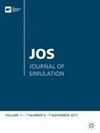一种混合仿真方法在按订单制造供应链可持续性绩效评估中的应用:以某商用飞机制造商为例
IF 1.7
4区 工程技术
Q4 COMPUTER SCIENCE, INTERDISCIPLINARY APPLICATIONS
引用次数: 3
摘要
摘要:与大规模生产链相比,航空航天工业中常见的按订单制造(MTO)供应链非常复杂。此外,重要的长期挑战之一是其整个供应链的可持续性表现。然而,考虑到所涉及的复杂性,这不是一项容易的任务,因此决策支持工具是从可持续性绩效角度理解整个供应链的基本工具。本文以模拟为研究方法,提出了一种考虑关键可持续性指标的混合层次绩效评估模型。该模型是混合的,因为使用了不同的模拟方法——系统动力学(SD)、离散事件模拟(DES)和基于代理的模拟(ABS)。该模型应用于航空航天制造商的真实案例,以评估替代SC的可持续性性能。与现有贡献不同,这项工作从可持续性性能的角度解决了按订单生产的供应链,并且不影响不同制造功能和资源的代表性。本文章由计算机程序翻译,如有差异,请以英文原文为准。
A hybrid simulation approach applied in sustainability performance assessment in make-to-order supply chains: The case of a commercial aircraft manufacturer
ABSTRACT Make-to-order (MTO) supply chains (SC), common in aerospace industries, are very complex compared to mass production chains. Moreover, one of the significant long-term challenges is sustainability performance across its entire supply chain. However, this is not an easy task given the complexity involved, so decision support tools are fundamental instruments in understanding the entire supply chain from a sustainability performance perspective. Using simulation as a research method, this article proposes a hybrid and hierarchical performance assessment model, considering key sustainability indicators. The model is hybrid due to the use of different simulation methods– System Dynamics (SD), Discrete Event Simulation (DES), and Agent-based simulation (ABS). The model is applied to an aerospace manufacturer’s real case to assess the sustainability performance of alternative SC. Unlike existing contributions, this work addresses the make-to-order supply chain from a sustainability performance perspective and does not compromise the representation of the diverse manufacturing functions and resources.
求助全文
通过发布文献求助,成功后即可免费获取论文全文。
去求助
来源期刊

Journal of Simulation
COMPUTER SCIENCE, INTERDISCIPLINARY APPLICATIONS-OPERATIONS RESEARCH & MANAGEMENT SCIENCE
CiteScore
5.70
自引率
16.00%
发文量
42
期刊介绍:
Journal of Simulation (JOS) aims to publish both articles and technical notes from researchers and practitioners active in the field of simulation. In JOS, the field of simulation includes the techniques, tools, methods and technologies of the application and the use of discrete-event simulation, agent-based modelling and system dynamics.
 求助内容:
求助内容: 应助结果提醒方式:
应助结果提醒方式:


